DigitalK Day 2 Report
Continuing to report on the last few events that took place in Sofia this week.
Day #2 of DigitalK started with the presentation of Piotr Jas of BlaBla Car. What I really liked about it (picture TBA) was one particular graph depicting the various types of travel (time before travel vs. cost of travel) and visualizing different industries (e.g. air travel) or competitor companies. The image clearly exhibited a blank space which is the exact market segment where BlaBla Car have positioned themselves in.
A very practical and easy to use tool for entrepreneurs in my opinion.
From the rest of the keynotes I can outline two in particular: Ivan Hernandez' Disruptive Innovation and the future of Digital Transformation and The future of Tech and Communities by Tim Röhrich.
I liked them because both were very inspirational although not telling you something which you haven't heard before. They were basically reinforcing the spirit of the event.
In the small hall there was a workshop called How to turn a good idea into a successful start-up led by Daniela Neumann, which didn't turn out to be what I expected. She was talking about the early cycle of idea/customer validation and I don't remember any particular example being shown. Frankly most of the people have heard about this before (myself included) and were quite bored. Not many of them stayed till the end.
The evening continued with the already traditional Silicon Drinkabout in Sofia which hosted many of the conference attendees. I did a quick visit only because I had to prepare myself for Bulgaria Web Summit on the next day!
There are comments.
Twilio meetup and DigitalK 2014 Day 1
The conference season (this week) is officially open! So here's my report about it.
It started by accident last evening with a warm-up event sponsored by Twilio at betahaus Sofia. I had the pleasure to have a long chat with Lisa from Twilio over a few beers.
Today was Day #1 of DigitalK which is the leading SEE technology event. I've also visited the event last year and must say that this time it is bigger. The main hall was totally packed. The WiFi connectivity has been improved since last year but still sucked. I had more success using my 3G instead.
The most interesting part of Day #1 was the mini Seedcamp session which presented 10 startups. In order of appearance they are
Viblast, Stepsss and Talkie were the 3 finalists who also presented at the main hall. Needless to say the coolest one from technology point of view is Viblast, which is a peer-to-peer video streaming platform, utilizing WebRTC. They were also strong at the presentation and look very strong at the business level as well. I wish them good luck.
Stepsss is essentially a shoe sole with sensors paired with smart-phone apps to give runners more info and feedback. I like it because they are a hardware company although there's lots of competition in this space. I'd like to beta test their product and see what happens when I go dancing all night long :).
Talkie is an educational app for children which helps them learn new languages. I had the pleasure to see it in action before the actual presentation. The design is very cool and the app does seem usable and complete. However I don't see much of a technological challenge here and I'm not sure how will they deal with the strong competition in the ed-tech space. We'll have to wait and see.
From the rest ScaleWhale and Smartoken do seem interesting but I really failed to get how things will be organized on the technology side. Both ideas are run by a single person team, which is a recipe for disaster (judging from my own experience).
Tomorrow is Day #2 of DigitalK and on Saturday I'm moderating one of the rooms at Bulgaria Web Summit. Expect more reports soon.
There are comments.
HackFMI 3.0 Post-mortem
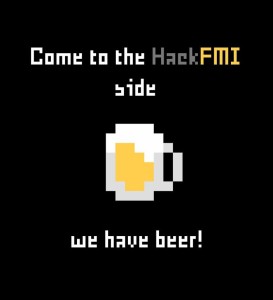
The fourth HackFMI, now traditional, hackathon was held this weekend. It is over and I still can't wrap my head around what happened during these 3 nights. Here's bits of code, beer, energy drinks and fun as I saw it.
A big thanks goes to Lilly and Misha who were running around like robots managing the day-to-day activities. Kudos to the rest of the team as well because they've established HackFMI as a tradition and people already ask when is going to be the next event.
What
This year the topic was Hack for charity and immediate goal of raising money for a sick kid. Most of the teams got to work to meet these goals. Only a few had worked on slightly different charity (broadly defined) ideas.
My favorite two apps were Blago-darenie and SMShelp although they were not developed with Django.
Blago-darenie is a simple WordPress site listing donation campaigns. Instead of directly donating money one needs to promise something (an action, an object, etc) and put a price tag on it. When the promise is claimed the two parties donate the money to that particular campaign and exchange the promised goods or services. I've promised to cook dinner involving tasty meatballs from horse meat and serve one of my wine bottles to whoever decides to donate 25 EUR. (disclaimer: I'm a good cook and love wine more than code).
SMShelp is an aggregator of donation campaigns via SMS which are very popular in the country but lack a central repository for all of them. A simple web site, live Android app and wonderful design secured the team the first place! BTW Team 8 was Adrian and Vihren who took part in all previous editions as well.
TODO
I'm glad both organizers and teams had listened to some of my feedback but there are still things to improve. The most obvious one was that a quick communication channel to all the teams is needed. Facebook and email just didn't cut it.
I already have couple of quick ideas involving Django and Twilio's cloud services. Let me take a few more days to get it clear before going any further.
/me
I found myself mentoring as much as I could helping folks with Django or just with general ideal or concepts, serving cake provided by Chaos Group and opening stacks of energy drinks, going door to door and letting teams know deployment and presentation details for the last day.
What surprised me a bit was that there were many new teams (some involving previous contestants) who were very diverse in their technological background. This presented a challenge to some of them as they had to use a technology which nobody on the team knew very well and had to make a working app with that. One team even changed from Python to PHP in the middle of day 2.
On Sunday I was pretty much helping the HackFMI team with whatever I can, checking on my favorite teams from time to time and giving access to cloud servers left and right to people who needed them.
Unfortunately I missed the Grand Finale due to unexpected hardware problems involving big iron and 150 litters of loose water :(. See you next time!
There are comments.
FOSDEM 2014 Report - Day #2 Testing and Automation
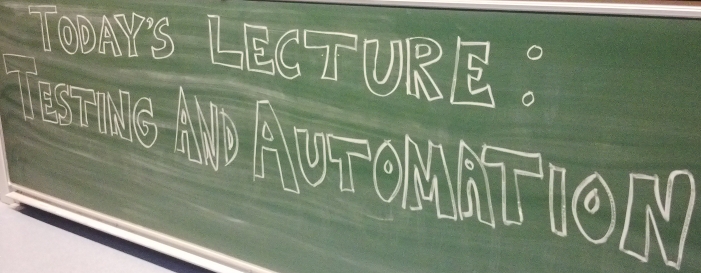
FOSDEM was hosting the Testing and automation devroom for the second year and this was the very reason I attended the conference. I managed to get in early and stayed until 15:00 when I had to leave to catch my flight (which was late :().
There were 3 talks given by Red Hat employees in the testing devroom which was a nice opportunity to meet some of the folks I've been working on IRC with. Unfortunately I didn't meet anyone from Fedora QA. Not sure if they were attending or not.
All the talks were interesting so see the official schedule and video for more details. I will highlight only the items I saw as particularly interesting or have not heard of before.
ANSTE
ANSTE - Advanced Network Service Testing Environment is a test infrastructure controller, something like our own Beaker but designed to create complex networking environments. I think it lacks many of the provisioning features built in Beaker and integration with various hypervisors and bare-metal provisioning. What it seems to do better (as far as I can tell from the talk) is to deploy virtual systems and create more complex network configuration between them. Not something I will need in the near future but definitely worth a look at.
cwrap
cwrap is...
a set of tools to create a fully isolated network environment to test client/server components on a single host. It provides synthetic account information, hostname resolution and support for privilege separation. The heart of cwrap consists of three libraries you can preload to any executable.
That one was the coolest technology I've seen so far although I may not need to use it at all, hmmm maybe testing DHCP fits the case.
It evolved from the Samba project and takes advantage of the order in which libraries are searched when resolving functions. When you preload the project libraries to any executable they will override standard libc functions for working with sockets, user accounts and privilege escalation.
The socket_wrapper library redirects networking sockets through local UNIX sockets and gives you the ability to test applications which need privileged ports with a local developer account.
The nss_wrapper library provides artificial information for user and group accounts, network name resolution using a hosts file and loading and testing of NSS modules.
The uid_wrapper library allows uid switching as a normal user (e.g. fake root) and supports user/group changing in the local thread using the syscalls (like glibc).
All of these wrapper libraries are controlled via environment variables and definitely makes testing of daemons and networking applications easier.
Testing Documentation
That one was just scratching the surface of an entire branch of testing which I've not even considered before. The talk also explains why it is hard to test documentation and what possible solutions there are.
If you write user guides and technical articles which need to stay current with the software this is definitely the place to start.
Automation in the Foreman Infrastructure
The last talk I've listened to. Definitely the best one from a general testing approach point of view. Greg talked about starting with Foreman unit tests, then testing the merged PR, then integration tests, then moving on to test the package build and then the resulting packages themselves.
These guys try to even test their own infrastructure (infra as code) and the test suites they use to test everything else. It's all about automation and the level of confidence you have in the entire process.
I like the fact that no single testing approach can make you confident enough before shipping the code and that they've taken into account changes which get introduced at various places (e.g. 3rd party package upgrades, distro specific issues, infrastructure changes and such)
If I had to attend only one session it would have been this one. There are many things for me to take back home and apply to my work on Fedora and RHEL.
If you find any of these topics remotely interesting I advise you to wait until FOSDEM video team uploads the recordings and watch the entire session stream. I'm definitely missing a lot of stuff which can't be easily reproduced in text form.
You can also find my report of the first FOSDEM'14 day on Saturday here.
There are comments.
FOSDEM 2014 Report - Day #1 Python, Stands and Lightning Talks
As promised I'm starting catching up on blogging after being sick and traveling. Here's my report of what I saw and found interesting at this year's FOSDEM which was held the last weekend in Brussels.
On Friday evening I've tried to attend the FOSDEM beer event at Delirium Cafe but had a bad luck. At 21:30 the place was already packed with people. I managed to get access to only one of the rooms but it looked like the wrong one :(. I think the space is definitely small for all who are willing to attend.
During Saturday morning I did a quick sight-seeing most notably Mig's wine shop and the area around it since I've never been to this part of the city before. Then I took off to FOSDEM arriving at noon (IOW not too late).
I've spent most of my day at building K where project stands were and I stayed quite a long time around the Python and Perl stands meeting new people and talking to them about their upgrade practices and how they manage package dependencies (aka promoting Difio).

Fedora stand was busy with 3D printing this year. I've seen 3D printing before but here I was amazed of the fine-grained quality of the pieces produced. This is definitely something to have in mind if you are building physical products.
Red Hat's presence was very strong this year. In addition to the numerous talks they gave there were also oVirt and OpenShift Origin stands which were packed with people. I couldn't even get close to say hi or take a picture.
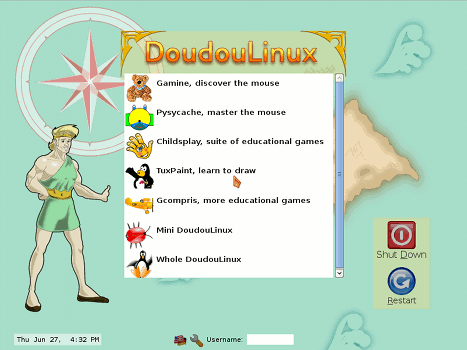
Near the end of the day I went to listen to some of the lightning talks. The ones that I liked the most were MATE Desktop and DoudouLinux.
The thing about MATE which I liked is that they have a MATE University initiative which is targeting developers who want to learn how to develop MATE extensions. This is pretty cool with respect to community and developers on-boarding.
DoudouLinux is a Debian based distribution targeted at small children (2 or 3 years old) based on simple desktop and educational activities. I've met project leader and founder Jean-Michel Philippe who gave the talk. We chatted for a while when Alejandro Simon from Kano came around and showed us a prototype of their computer for children. I will definitely give DoudouLinux a try and maybe pre-order Kano as well.
In the evening there was a Python beer event at Delirium and after that dinner at Chez Leon where I had snails and rabbit with cherries in cherry beer sauce. I've had a few beers with Marc-Andre from eGenix and Charlie from Clark Consulting and the talk was mostly about non-technical stuff which was nice.
After that we went back to Delirium and re-united with Alexander Kurtakov and other folks from Red Hat for more cherry beer!
Report of the second day of FOSDEM'14 on Sunday is here.
There are comments.
HackFMI 2013 Hacker Gifts
HackFMI starts tonight! During the previous edition of the hackathon I gave one team a special personal gift based on my estimation of their hacker level! Thanks to Vihren Ganev (one of the gift winners) for reminding me about that!
This year I have even bigger items to give to those who think out of the box, who hack
their way around and are brave enough to try and change the world through software!
I have one
Lenovo Thinkpad Business Backpack
and one
Lowepro D-Res 20 AW Digital Camera Bag
(a bit bigger than the one on Amazon, easily fits a BlackBerry Z10) as seen on the pictures below.
Plus some small Red Hat branded items.
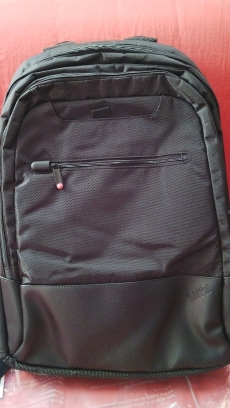
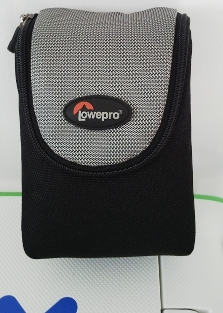
How To Get The Gifts
There are no rules, I will make a decision as I go along. I can give away all items or none. It's up to you! Surprise me!
Tomorrow I will be mentoring the teams who decided to work with Django but I'm happy to talk to anyone who needs help or just wants to grab the cool stuff! See you there!
There are comments.
Upcoming Talk: Fedora Test Days in Sofia
On September 28th I will be giving a short talk about Fedora Test Days at the regular Linux for Bulgarians conference. I will explain what these are and how one can participate. I will also announce my plans and schedule to organize some Fedora 20 test days locally in Sofia. If you are a fan of Fedora and want to file bugs and kick some developers' ass this is the way to do it!
Other talks include Alexander Shopov's „Oracle's take on NoSQL“ which I wanted to hear since this summer and TBA talks about MicroTik routers.
The conference will take place on September 28th at the French Institute at Sofia University (see map). It starts at 13:00 and my talk should be at the beginning. See you there!
PS: this post was initially written on my BlackBerry Z10 with Penzus Editor - another small step in retiring my laptop.
There are comments.
Notes From Two Interesting GUADEC Talks
As this year's GUADEC is coming to an end I'm publishing an interesting update from Petr Muller for those who were not able to attend. Petr is a Senior Quality Engineer at Red Hat. His notes were sent to an internal QE mailing list and re-published with permission.
As this year's GUADEC happened in the same building where I have my
other office, I decided to attend. I'm sharing my notes from the two
sessions I consider to be especially interesting for the audience of
this mailing list:
== How to not report your UX bug ==
Speaker: Fabiana Simões
Blog: http://fabianapsimoes.wordpress.com/
Twitter: https://twitter.com/fabianapsimoes
Do not do this stuff:
* Do not simply present a preferred solution, but describe a problem (a
difficulty you are having, etc.)
* Do not use "This sucks" idiom, not even hidden in false niceties like
"It's not user friendly"
* Do not talk for majority, when you are not entitled to ("most users
would like")
* Do not consider all UX issues as minor: an inability to do stuff is
not a minor issue
What is actually interesting for the designer in a report?
* What were you trying to do?
* Why did you want to do it?
* What did you do?
* What happened?
* What were your expectations?
More notes
* Write as much as needed
* Describe what you see, did and *how you felt*
* Print screen is your friend!
* *Give praise*
== Extreme containment measures: keeping bug reports under control ==
Speaker: Jean-Francois Fortin Tam
Homepage: http://jeff.ecchi.ca
Twitter: https://twitter.com/nekohayo
Discussed the problem lot of OS projects are having: lot of useless
(old, irrelevant, waiting for decision no one wants to make) bug/rfe
reports in their bug tracking systems. Lots of food for thought about
our own projects, internal or external. Clever applications of
principles from personal productivity systems such as GTD and Inbox Zero
for bug tracking.
The talk was mostly an applied version of this blog post, which is worth
reading:
http://jeff.ecchi.ca/blog/2012/10/08/reducing-our-core-apps-software-inventory/
I particularly like the UX bug reporting guide lines. Need to take those into account when reporting UI issues.
I still haven't read the second blog post which also looks interesting although not very applicable to me. After all I'm the person reporting bugs not the one who decides what and when gets fixed.
There are comments.
The 51st Annual Meeting of the Association for Computational Linguistics
Two hours ago I've heard on the radio about the 51st Annual Meeting of the Association for Computational Linguistics which is held at the moment in Sofia According to the guest speaker (a professor from Bulgarian Academy of Science) the official program will be over today but the next two days will feature workshops and tutorials.
Definitely not to be missed if you are in Sofia. I'm not unfortunately :(. If you can please visit and share what you saw with me. Thanks!
There are comments.
Summer Hackathon in Sofia

A summer hackathon will be held in Sofia between 16th and 22nd of August. The week prior to the event (12th to 15th) will be full of lectures and workshops to prepare the students for their task.
The goal this time is to create a new system for the Student Council organization which will host their new website and also provide more transparency into the organization and the work they do. The idea is initiated by the chairman of the council which is quite surprising for me to hear. You can read his motivation (in Bulgarian) here.
At the moment it is agreed that the system will be written in Python and Django and this is where I join. Together with Kiril Vladimirov I will be leading the Python/Django lecture and workshop in one of the days, likely 14th of August.
The program is not yet finalized so I can't share more info. Please watch this space for more details when they are available.
There are comments.
July Events - BlackBerry Mini Jam and Devel Conference
If you happen to be on holiday in Bulgaria but would still like to meet some hackers there are three events this month that I find interesting: Plovdiv Conf, BlackBerry Mini Developer Jam and Varna Conf.
 Image: source code from a game development course held at Sofia University couple of years ago.
Own work.
Image: source code from a game development course held at Sofia University couple of years ago.
Own work.
Plovdiv Conf
Plovdiv Conf will be held at the Plovdiv Fair on July 6th 2013. There isn't an official program but the speaker profiles are interesting. Among them are guys well known for their Ruby and Linux skills.
From the given list I recognize only half the names. One speaker that sounds interesting to me claims experience with programming assembler for the mainframe.
My friend Alexander Kurtakov from Red Hat/Eclipse will be there as well so I'm planning to attend this event.
BlackBerry 10 Mini Jam Sofia
Organized by BlackBerry Developer Group Balkan the BlackBerry 10 Mini Jam Sofia will be held on July 11th 2013 at betahaus Sofia. Last time I visited a BlackBerry developers session it was very interesting.
My personal interest at the moment is not developing mobile applications but I'd like to hear more about the possibilities. My understanding is that BlackBerry 10 is much more flexible as a development platform compared to Android and iOS.
I will definitely attend this event because there will be a shiny new BlackBerry Z 10 waiting for me there :). I will tell you how to secure one after I get it.
Varna Conf
Varna Conf is organized by the same people who do Plovdiv Conf. It will be held on July 20th 2013 at Cherno More hotel in Varna.
Most of the speakers I don't know but there are couple of topics about testing and refactoring which look interesting. However I will be more likely to socialize with the local development groups rather than listening to all talks.
I'm not sure if I will attend though. My initial plan was to attend but there are other personal errands that are popping up. Given that it is not near Sofia I will probably skip it.
If you happen to be on holiday at the Bulgarian sea side however, you should definitely check it out. And Varna is a very nice city too.
Let me know if there are other interesting events in the vicinity! Use the comments and tell me where are you going this month.
There are comments.
Balkan Venture Forum Sofia Post-mortem
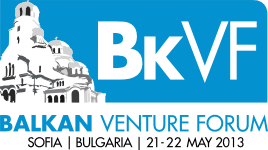
Balkan Venture Forum in Sofia is over. It's been two very exciting days, full of many interesting talks both on stage and off stage.
There were so many things that happened and so many new people I met that it will be hard to mention all of that in a single blog post. I just want to highlight the things I enjoyed the most.
Networking & pitching at the bar
I've been invited to BkVF long ago. However my initial intention was not to attend because this month proved to be very busy. I've changed my mind after Boyan Benev, one of the organizers invited me 10 days ago with an interesting proposal - distribute Difio's beer mats at the bar!

So I was there for the networking. As I used to say when people asked me if I was pitching
I am pitching at the bar!
Networking was very intensive both during the coffee breaks and cocktail and during the sessions. I've now got close to 50 new business cards in my pocket. I've met very cool guys and gals both developers and non-tech.
From the companies that were pitching in the main hall I particularly liked Imagga, Transmetrics and Kimola. Imagga was probably the most deep-tech/science oriented company at BkVF while Transmetrics and Kimola focus on cloud and big data solutions.
BlackBerry development session
OK, I'm not into mobile technology nor smart phones but that may change soon. BlackBerry had a strong presence and I was able to talk to some of their developer support folks. The OS of BlackBerry 10 is based on QNX kernel with multiple SDKs available to write apps. Most of all I like the fact that it is POSIX compliant with C/C++ native SDK available. Qt/QML is also available.
I'm particularly interested in how hard it will be to port some existing open source tools to BlackBerry. I'm talking Bash, Python and the command line tools I currently use on Linux. I'll be contacting them in the near future to get a device for testing and hacking and will keep you posted.
There are comments.
HackFMI Post-mortem

The first HackFMI event is now over :(. It was HUGE! Kudos to the organizers, sponsors, mentors and all teams who took part and worked hard during the weekend.
More than 100 people participated. There were 22 different teams presenting at the finale yesterday evening. That in my opinion counts as a BIG success. I was surprised to see so many people, lots of them first and second year at the university. There were a good number of female hackers too, which I also didn't expect. DISCLAIMER: I've graduated a different university where the culture and male/female ratio was different so my expectations were biased.
People had interesting ideas and were passionate about them. They set off hacking on a big scale. At times they wanted to create too big of an application and had to cut off some features due to time constraints.
Congrats to all of them and hopefully they continue hacking!
What Happened
I wasn't able to talk to all the teams nor stay at the event full time but here is how I saw things.
Organization was perfect. The best organized non-commercial local event I've seen in years. There was food, beverages, T-shirts, even beer :). There were six big IT companies sponsoring the event. All of these are successful Bulgarian born companies. Let that serve as an example!
The faculty was supporting the event too. There were API and SQL dump for the teams to use. The entire building was open during the weekend and during the night. Teams were able to make use of many rooms. From what I know some of the successful ideas will be implemented into the faculty administration as well. All of this is a first time and quite unexpected for a Bulgarian university. I smell the wind of change already.
Technology
My technology view of the event is limited to the teams I've mentored explicitly and the ones I happened to walk by and interfere with. Naturally I gravitated around 4 teams using Django and found two teams using PHP.
Django guys were doing well despite one of the teams not having any experience with it. Most of the applications were such that didn't require extensive knowledge of Django internals but require mere programming of all features they wanted to implement.
What stroked me is that folks were making their database models too complicated. I stumbled across two use cases in different teams where they wanted to have one to many or many to many relationships. I strongly advised against this. Hopefully they will remember.
Django makes schema design a child's play and probably this is why lots of people abuse and misuse that. My advise is keep the database as simple as possible and move everything up the application layer. It's easier to change and to maintain that way. Not to mention experienced DBAs are hard to find.
**Keep the DB simple and know your tools well! **
With PHP the case was pretty much the same. Guys had some extra fields in their DB schema which were unnecessary. They also wanted to abuse the data types of the DB and not use native types.
All of these technological misunderstandings are coming from inexperience, I know. To get a closer look at why it is important to have a simple schema look at: Disqus: Scaling the World’s Largest Django Application
The Hackers
During one of the breaks I was outside and one of the mentors complained that ideas were pretty much standard. No screen scraping for additional information, no mashing up, no revolutionary ideas. Everybody was using the provided API and SQL dumps. Well almost.
One of my favorite teams set off to write a PHP robot which will automatically login and extract information from SUSI (the faculty information system). Unfortunately that didn't work so they had to abandon it. They didn't known Selenium and there was not enough time to try and hack some browser side extension which will do the trick but they promised to try it.
Because of their unorthodox approach from the start they became my personal favorites and received Red Hat swag from me.
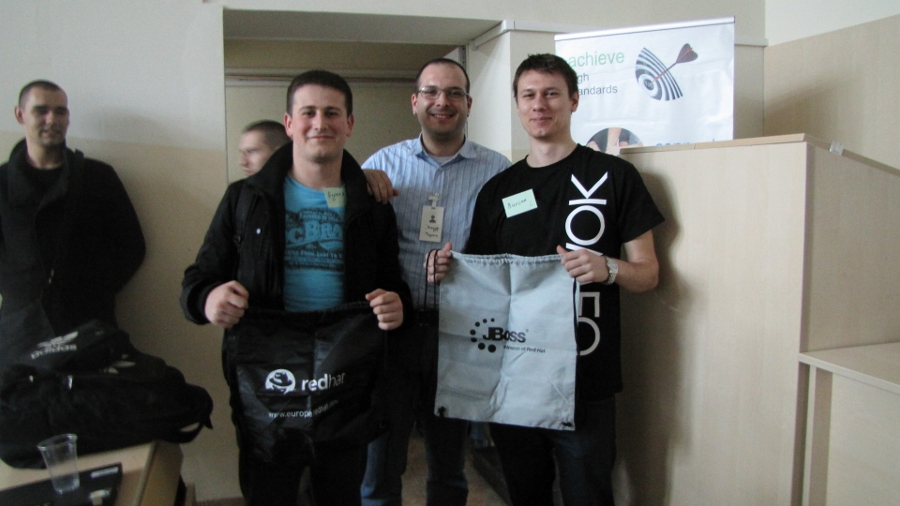 Adrian and Vihren are Team Six!
Adrian and Vihren are Team Six!
What I didn't like
I didn't like the fact that there was lots of duplicate work and ideas. Only one team built a mobile application based on API and services provided by another team.
I suggest there's a #hackfmi IRC channel next time so that people can communicate with each other and focus on building great apps not reinventing the wheel. Use IRC, you are hackers!
What I was missing is that nobody proposed a pure cloud or big data application. I don't know if there was enough data provided by the faculty for such kind of ideas, probably there wasn't. Maybe next time there will be.
Ohloh Stats
While not participating actively except for a few hours of mentoring I found a way to contribute. Many of the projects repositories are listed under https://www.ohloh.net/p/hackfmi2013 which provides some interesting insight and stats.
The list is incomplete. Lots of teams didn't have any GitHub repos or didn't push the code recently. I will be contacting all of them in the next few days and hopefully we will have a more accurate statistics by the end of the week. Expect a separate blog post about it.
If you missed this event you should be sorry. You were warned! If you attended please share your experience with me. What you liked, what you didn't.
There are comments.
Upcoming Hackathons in Sofia
Hackathons have been organized in Sofia and generally through Bulgaria for the past several years but as far as I know they were mostly underground events. There are two upcoming events which are somewhat different.
"Record Voting" Hackathon

Organized by INSTITUTE FOR PUBLIC ENVIRONMENT DEVELOPMENT this hackathon is the first I know of, which will focus on government provided data. The objective is to process data (sample) from the 2011 elections and find persons who were able to vote in the last minute, between 20:00-21:00 hours thus changing the election results by 20% in their voting section.
The event starts at 09:29 on 30th Mar 2013 @ betahaus Sofia. More info in Bulgarian here and here.
I'd love to attend but will be visiting a conference about mobile devices in another town at the same time :(. If you do attend, let me know how fun it was.
Dare to read more on the topic about open government? I recommend starting with
Open Government: Collaboration, Transparency, and Participation in Practice by
Daniel Lathrop and Laurel Ruma (
Amazon
|
O'Reilly
). This is an excellent book with tons of examples and easy to read.
HackFMI

FMI stands for Faculty of Mathematics and Informatics at the Sofia University (not where I graduated). It's one of the best, arguably the best, places to study for an IT career. Like most other universities in Bulgaria its administration and processes suck big time!
HackFMI is the first ever hackathon which will focus on students improving faculty/university systems and processes. This is HUGE! As far as I know it is also the first hackathon which is supported by academia.
I have already volunteered to be a mentor at HackFMI. I am looking forward to this. It will be fun. See you there!
There are comments.
Page 2 / 2